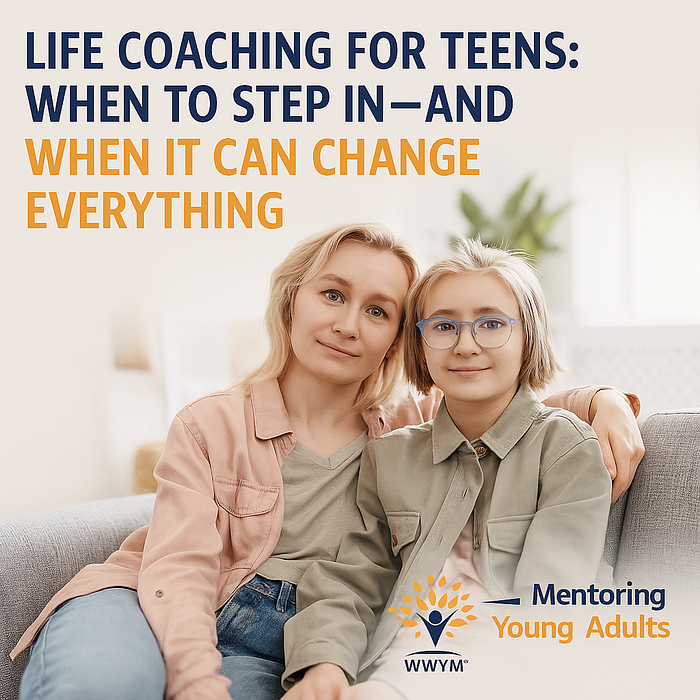Life Coaching for Teens: When to Step In—and When It Can Change Everything
 Mentoring Young Adults
Mentoring Young AdultsA Generation on the Edge
Sixteen-year-old Ava had always been a bright student. She loved art, got decent grades, and had a group of friends who made her laugh until she cried. But as high school progressed, Ava started to change. Her artwork stopped. She avoided social gatherings. Her grades dropped. Her parents were baffled. Was it laziness? Rebellion? Or something deeper?

Her story isn’t unique. Today’s teens are growing up in a digital storm of pressures — constant comparison, anxiety, overstimulation, and uncertainty about the future. Many parents are unsure when to step in, fearing they’ll say or do the wrong thing. Others jump in too soon or too forcefully, only to be met with resistance or silence.
This is where life coaching — or more precisely, mentoring for teens — can become a lifeline. But knowing when to step in and how mentoring can truly change everything is the key.
The Difference Between Typical Life Coaching and Mentoring Teens
Before diving into when to intervene, it’s essential to understand what “life coaching for teens” really means — especially when you’re looking for something more effective than standard talk therapy or traditional academic support.
Mentoring young adults is not just about setting goals or encouraging better habits. At Mentoring Young Adults, our approach addresses the emotional roots of challenges like anxiety, social withdrawal, and lack of motivation.
“Talk therapy isn’t for everyone. Mentoring might be a better option for your child. Why? It’s action-based.” — Ken Rabow, Founder
Unlike traditional coaching, mentoring is collaborative and practical. It doesn’t lecture; it partners. It doesn’t impose solutions; it builds them alongside the young adult, focusing on real-life skills, daily challenges, and meaningful progress.

When to Step In: Recognizing the Signs
If you’re asking yourself whether your teen needs help, you’ve probably already noticed some changes. But knowing what’s normal teen behavior and what’s a cry for help isn’t always obvious.
Here are critical signs that mentoring might be the right next step:
1. Chronic Anxiety or Avoidance
If your teen avoids school, social events, or even basic responsibilities due to stress, they may be battling communication anxiety, performance anxiety, or a deeper sense of overwhelm. It’s easy to mistake this for laziness or lack of care. But often, these are just symptoms of unspoken internal battles.
2. Isolation and Disconnection
Many teens withdraw from family, friends, and even hobbies they once loved. This social isolation is a red flag. Mentoring focuses on rebuilding trust, confidence, and connections — one conversation at a time.
3. Disorganization and Missed Milestones
Do they struggle to manage their time, complete homework, or plan for the future? These are life skills, not just academic tasks. Mentors work with teens to build custom routines, from sleep schedules to task prioritization, helping them regain control.
4. Low Self-Esteem or Negative Self-Talk
Phrases like “I’m a failure” or “I’ll never get it right” often reflect deeper belief systems. Mentoring is designed to reframe inner narratives, showing young people how to recognize their own growth and strengths.
The Turning Point: Ava’s Story (Continued)
Back to Ava. Her parents, desperate for help, tried therapy. She went twice. No connection. They tried punishments — no phone, no outings. It only pushed her further away.

Finally, they found Mentoring Young Adults and scheduled a free consultation. Ava was hesitant. She didn’t want another adult telling her what to do.
But her mentor, a trained professional through the Mentors Professional Workshop, didn’t preach. Instead, they started small — just talking once a week on Zoom. No pressure. No agenda.
“The mentee learns they are in charge; the mentor is there to help them avoid dead-ends.”
Over time, Ava set three small goals: go for a walk each day, complete one art piece a week, and improve her sleep schedule. Her mentor didn’t nag — he helped her troubleshoot when things got tough. Within months, Ava was painting again. She reconnected with a friend. She applied for a summer art program. Ava’s life didn’t change overnight — but it changed because someone showed her how to take ownership, step by step.
Why Mentoring Works When Other Methods Don’t
Why did mentoring succeed where other efforts failed? Because it’s not just advice — it’s guided action. Here’s what sets our mentoring apart:
✅ Action-Based Support
We help teens tackle real-life issues — making phone calls, completing applications, navigating academic demands. It’s hands-on guidance that creates visible momentum.
✅ Individualized Daily Routines
Each mentee develops a custom daily plan built around their challenges and goals. Whether it’s managing test anxiety or preparing for college, routines are designed for success.
✅ Parent Partnership
Our method isn’t just teen-focused — it involves parents through structured communication. Through email updates and optional Parent-Time sessions, families collaborate, support, and grow together — without falling into old judgment roles.
✅ Life Skills + Emotional Wellness
From managing time and building resumes to handling emotional setbacks, mentoring prepares teens for the real world while helping them feel safe and understood.
The Coaching Framework: A Closer Look
At Mentoring Young Adults, our system is grounded in decades of experience and consistent results. Here’s what our structured approach includes:
🧭 Initial Sessions: Creating Trust
Mentor and mentee meet virtually 1–2 times a week. The first phase focuses on building a relationship, understanding goals, and introducing the framework.
🎯 Setting Goals and Creating Daily Routines
We ask: What are three things you want to improve? Then we map the journey, identifying roadblocks and creating simple signposts for progress.
🧠 Working Through Emotional Challenges
From anxiety to fear of failure, mentors help teens reframe limiting beliefs and face emotional challenges with practical tools and encouragement.
📚 Academic and Career Guidance
Whether it’s high school, college, or the workforce, we help teens build resumes, prepare for interviews, and explore careers that match their interests and strengths.
📈 Toward Independence
Mentoring isn’t forever. Our goal is to build resilience so that each mentee can confidently graduate from the program and face life on their own terms.
Life Coaching Near Me? Why Virtual Mentoring Might Be Better
You may be Googling “life coaching near me” to find someone local — but geography doesn’t have to limit your options.

Our mentoring happens online, allowing us to match your child with the perfect mentor, not just the closest one. We handle the logistics, so you focus on watching your teen thrive.
And the bonus? Online mentoring fits today’s teens perfectly — digital natives who often feel more comfortable opening up in a virtual space.
Mentors Wanted: Changing Lives Can Be a Career
Inspired by what we do? Our founder, Ken Rabow, also trains adults in their 40s, 50s, and 60s to become paid mentors through MentorsProfessionalWorkshop.com.

Graduates of the program get matched with ideal clients, while we take care of business logistics. As Ken puts it:
“You spend your time changing lives. We take care of the rest.”
When Mentoring Changes Everything
Ava’s story is one of many. There’s also Hunter, who felt aimless until mentoring helped him reconnect with his strengths. There’s Sandy, a parent who described our approach as “the first time someone truly understood my child.”
So… when should you step in?
When you see your child hiding from the world instead of stepping into it.
When advice, punishment, or traditional therapy hasn’t worked.
When you’re ready to give your teen a guide, not a judge.
And when mentoring works? It doesn’t just help teens survive adolescence. It helps them thrive in life.
Want to Help Others? Become a Mentor
Are you someone in your 40s, 50s, or 60s looking for meaningful work? Our Mentors Professional Workshop trains adults to become paid life coaches for teens. We handle the business side so you can focus on making a difference.
Learn more: Watch our training overview video
Your Next Step
We know reaching out for help is hard. But our program exists because families like yours needed more than vague solutions.
We offer:
Free consultations to explore whether mentoring is the right fit.
A proven, compassionate framework that works.
Real testimonials from real families.
If your teen is struggling, or you just want them to build confidence, gain life skills, and move toward independence, don’t wait for a rock-bottom moment.
Let’s change everything — together.
Subscribe to my newsletter
Read articles from Mentoring Young Adults directly inside your inbox. Subscribe to the newsletter, and don't miss out.
Written by

Mentoring Young Adults
Mentoring Young Adults
Ken Rabow, CEO & Founder of World Wide Youth Mentoring, walks you through our unique approach to mentoring and how we help young adults overcome obstacles and achieve success.